Before we dig into the details of our planning guide, we just want to combat a few misconceptions about procrastination.
People beat themselves up for procrastinating and often attribute it to laziness. We’re here to tell you now that procrastination ≠ laziness. Instead, procrastination tends to arise from:
- Not having clarity in your task (e.g. it’s not specific enough)
- Not having the confidence the achieve the task
- A lack of self-regulation (knowing when to hop off TikTok, and get to work!)
These arise from a variety of things, which is why it’s important to figure out why you’re procrastinating before you start taking action. That’s what our guide is all about.
If you finish this article and feel like you need more help, check out our procrastination course on StudyTime Academy. It’s completely free and goes into all of this in video form if you’d rather see our faces instead.
Let’s get into it then.
Why Are You Procrastinating?
Take a long hard look in the mirror next time you’ve spent an afternoon on TikTok and assess why you’ve reverted to procrastinating rather than doing all the things you promised yourself you would. Understanding why you’re putting off your tasks is the first step to begin combating procrastination. Tag yourself below.
Lack of Direction/Clarity
Sometimes we don’t do things because we don’t know exactly what things we need to do. It’s terrifying to look at something ambiguous like ‘study physics’ when you don’t even know where to start.
You’ll probably end up procrastinating so that you don’t have to face the unknown’s (especially if it’s something you dislike).
Tackling this means understanding the areas of your work that you are least confident with. Knowing what you don’t know is a tricky thing at times, but well worth figuring out. Any big task is actually just a stack of small tasks in a trenchcoat. Knowing what those small tasks are will make you more confident in fighting them, rather than procrastinating.
A great way to combat a lack of direction is to prioritise your tasks. Numbering your to-do list, or highlighting things you want to get done first makes it a lot easier to figure out where to start.
If your to-do list is 30 tasks long, no matter how well articulated they are, you’ll spend all your brain-power deciding what to start with and have nothing in the mental tank to actually start them.
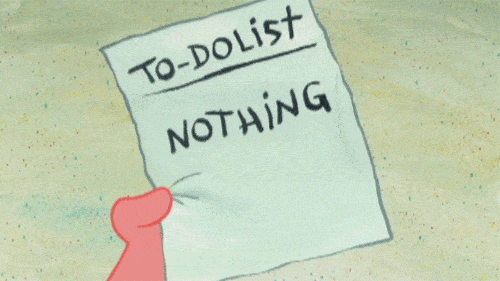
Key points:
- Make sure that your tasks are as specific as possible. For example, “Complete the 2019 mechanics exam paper” or “read one chapter of my English novel” instead of “study for English” or “do biology”.
- Keep your to-do list in order! Prioritise your tasks (through numbers, or stars, maybe highlighting if that’s your jam) so that you don’t have to figure out which one to start with.
Tasks are Too Hard
If you sit down with a bunch of practice questions when you barely understand the concepts, you’ll quickly give up since you don’t know where to start. You’ll call it a lost cause and you’ll be tempted to hop back on TikTok. Sometimes we won’t even begin a scary task because we tell ourselves it’s useless, so why bother starting?
These feelings can be driven by perfectionism, which isn’t as good a thing as people have led you to believe. Often, perfectionism is driven less by a desire to achieve, but a fear of failing. Instead of wanting to do well, we may be terrified of bombing and looking ~ silly ~ or of disappointing someone.

It can be paralyzing, the desire to do well but the overwhelming fear of getting it wrong. Hence, procrastination.
There’s nothing wrong with aiming for ‘perfection’, as long as you know the likelihood of that happening is smol. Nothing is right the first time and you have to get something wrong to know how to get it right. It’s a fact of life and a fact of being human.
It’s a hard pill to swallow, but accepting that first drafts and iterations are gonna need work will be better in the long run. Accept drafts (and failures) as a fundamental part of your study because it really is one of the first steps. If you got it all right the first time, what’s the point of being in school?
How to combat the fear of failure:
- Be gentle with yourself. If you expect yourself to do a bunch of hard things at once, then inevitably don’t get them done, you’ll beat yourself up about it, and you’ll be way less motivated to give it another go tomorrow.
- Remind yourself that failure (however you define failure to yourself) doesn’t mean you haven’t learned anything or progressed your knowledge in some way.
- If your final goal is to do a bunch of practice questions, break your task down into easier steps. Maybe you need to find the main topics of the subject first. Then do a mind map or brainstorm of all the information for each topic. Then maybe you could do practice questions, once you have those notes to work with as well. If you make things easier for yourself, you’re far more likely to succeed.
Struggling with Self-Regulation
Self-regulation is defined as the voluntary regulation of conflicting thoughts, feelings, and actions in accordance with long-term goals. Essentially, being able to get through the tough stuff in the short term, because you know it will be beneficial in the long run.
If your study is too long or too boring, your brain will not have the endurance to do any sort of task – we are all human after all. If you do definition flashcards for 4 hours straight your head might just pop off your neck and roll away (to find your phone for some TikTok scrolling).
Similarly, if you plan to do five practice exams back to back because you’ve left your study to the night before, your eyes will start seeing double and the clock on the wall might start whispering secrets to you (we’ve all been there).

Willpower and attention are finite things, we can’t always give ourselves a plucky protagonist pep talk and keep going with more gusto than before (no matter what anime says otherwise).
How to stay engaged with your work:
- Spice up your studying! Don’t plan for 2 hours of organic chemistry, but instead try doing a bunch of small tasks for different subjects to keep things interesting (or at least, as interesting as organic chemistry can be).
- Try the Pomodoro Technique, which is where you study for 25 minutes, and then have a 5-minute break. That way, you’re literally making time to scroll TikTok for 5 minutes, play with your dog, or grab a snack. Every 25 minutes can be dedicated to a specific task, so then you’re changing it up regularly and you hopefully won’t be as bored.
- Try different study methods, for example: Mind maps; flashcards, youtube videos; testing a friend or family member (or the dog), or attempting past exams.
You may find yourself fitting into a couple of the categories, or even all three, and that’s okay. Now we have found the problem, we can aim to work around it in order to keep you on track for your study goals.
Where to Start Your Plan?
What is Your Focus?
This is a generalised article but planning can work wonders for any sort of task. Whether it’s a huge internal, a specific subject or even just exam season in general. Honestly? You could probably use this guide to plan for non-study things too. We’re not judging.
The first step is to figure out what your specific focus is to give your plan direction (and a better chance of success).
The second step is thinking about what the goal of this plan is. Is it because you’re falling behind and need a plan to catch up to pass? Or is it because you’re reaching for Excellence? These will make for very different plans.
Assess Where You’re at
To go from point A to B, the first step is understanding where A and B are, otherwise you don’t know how far you’ve got to go. This might sound confusing, but Point A is what you know right now, and Point B is your goal. Our job is to help you get there!
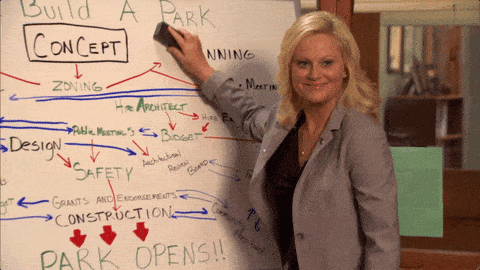
Here’s what you can do:
- Go through each of your subjects. This could be as simple as listing them down. For most of us, this is around 5-6 subjects, but this will vary depending on your course.
- Write down any deadlines for specific subjects, or if you know you struggle with one subject in particular, chuck a star next to it so that you can identify what needs immediate attention.
- Go through the work you’re doing in each subject. For example, write out the internals that you’re working through at the moment, or if you’re closer to exam season, write down the externals that you’re planning to sit.
Now that you have this list, it’ll be a lot easier to see everything on your plate at the moment, and it becomes a lot easier to plan your studies when you don’t have mystery internals popping up and ruining your plans. And no, we’re definitely not speaking from experience with that one.
Plan for the Unexpected
One of the most frustrating things is when you’ve created your perfect study plan, and you finally feel like you’ve mastered the beast that is the NCEA system… and then something pops up that you weren’t expecting, and it all comes crashing down.
So how can you plan for the unexpected?
It’s simple: keep your plan flexible.
Anticipating possible challenges is tough, but if your study plan is flexible enough, it shouldn’t affect you too badly. One way of combating this is to do “if, then” planning. This just means that if something happens, you know what you’ll do in response. This might sound scary, but it’s easier than it seems.
For example, if you have an internal that you’re working on, you could say to yourself “If I spend my research time struggling and I don’t find any good information, then at the end, I will contact my teacher and ask for some help.”
Having an “if, then” plan for things you find challenging makes it a lot easier because when you get stuck, instead of procrastinating, you have a plan of attack to move forward.
Another thing you can do is add a ‘catch up day’ into your schedule or study plan (especially if you’re trying to plan lots of things at once – like studying for mocks, or preparing for your exams).
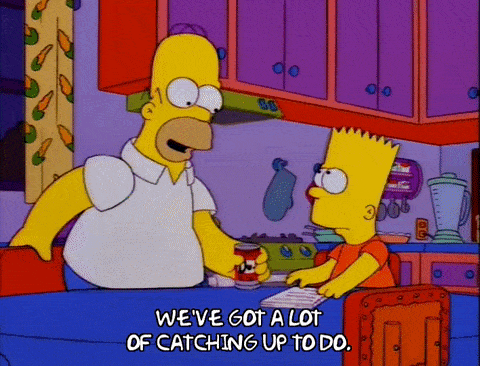
This is essentially a day where you dedicate yourself to sitting down for a set amount of time, and anything you don’t get done during the week, you have time to finish it off.
This can be really helpful if you’re one of those people who end up making elaborate study schedules and then get annoyed at yourself when you miraculously didn’t end up doing 2 hours of physics, before reading a novel for English – all on a Tuesday morning!
So give yourself a day to recover and catch up, and you’ll be good to go!
How Do You Make a Good Plan?
Anyone can make a plan, but how do you make sure that yours is halfway decent?
Here are our top tips for making a good plan, a great one:
- Prioritise your tasks so that you’re tackling the right things at the right time. If you have an internal due tomorrow, now’s not the time to start preparing for your exams in a few months! Prioritise based on what you’re struggling with, but also the subjects that you want to aim higher for as well.
- Be realistic. Start small to build some good habits, and reward yourself for the small wins. This way, you’re aiming for consistency and routine habits, rather than making The Plan something so hard to reach, that you’ll never actually get anything done.
- Be aware of your mental energy. Some days, you might feel ready to take on the world. Other days, it’s hard enough to get yourself out of bed and dressed for the day – and that’s okay! Everyone has a finite amount of willpower. There’s more to life than just sticking to a study schedule.
- Have a way to avoid procrastination if you get bored. For example, if you’re bored of a task, have another one that you can switch to (e.g. changing subjects) or take a 5-minute break to grab yourself a snack. Allowing yourself these small breaks means you’ll get more done in the long run than if you give in to procrastination and spend hours on youtube.
- Be specific about your goals and tasks that will get you there. For example, instead of saying “write an essay” as a task (something that will scare your brain, and you’ll likely procrastinate to avoid such a mammoth task), you can break it down. Think of what you can do today, or this week, to achieve your goals. Maybe that essay can become a few smaller tasks, like researching, planning, writing the introduction, one paragraph, proofreading the essay, and submitting it.
- Think about your ‘why’. This sounds really cliché, but thinking about why you want to achieve your goals can be a great motivator and a way to combat procrastination. We always like to come up with something specific to look forward to once everything is done, like a holiday with family, hanging out with some friends, or spending a whole day playing games and not feeling guilty about it. Whatever it is, come up with something that sounds appealing to you. This is a great way to keep yourself on track, and you don’t get bummed out by all the work when you know the end is in sight! So come up with something fun, set a date, and work towards it.
- If you struggle to stay on task, again, try the Pomodoro study technique. This means studying for 25-minutes and then taking a 5-minute break. Every 3-4 sessions, you can take a longer break (e.g. 40mins – 1hour). This is such an effective way to study, and it creates a routine where you go easy on yourself while still getting work done. Studying is a marathon, not a sprint, and the last thing you want is to burn out too early.
How To Make Your Plan Work For You
Everyone is different, and because of this, we all have different ways of studying. You know yourself better than everyone, so make your plan work for you. If you’re a night owl, there’s no point convincing yourself that you can work from 8am onwards. Instead, recognise that you’re not that kind of person, and create a plan that’s easier to stick to. No one said you can’t be productive if you start at 2pm instead!

Here are a couple of things to consider when thinking about your plan:
Digital vs. Paper
This may seem like a small choice, but it makes a big difference. Your choice will vary depending on what systems you already have in place.
Ideally, your plan needs to be somewhere that you won’t forget about it.
If you go digital, there are the distractions of Youtube and Netflix, so it might be worth considering a site blocker so that you have to type in a password before you’re able to access specific websites.

Things to consider:
- Which systems do you already use? This will heavily impact your choice to go digital or remain with paper
- Will you forget your plan if it’s online vs on paper? Perhaps sticking a piece of paper to your bedroom wall will make sure that you remember what you need to do, or it might be easier for you to have an app on your phone that gives you alerts instead?
- Do you need the satisfaction of physically ticking off each task? Or are you okay with doing that online instead.
- Would you benefit from having reminders, or would that just piss you off a little too much?
Flexibility
People function in different ways, so make sure that your plan is flexible enough to adapt to your lifestyle.
Here are some things to consider:
- Time for relaxing and spending time with friends and family.
- A ‘catch up day’ so that you don’t fall behind with your plan
- Have you been realistic with how much you’re expecting yourself to do in a day? In a week?
- Do you need a time-blocked calendar with blocks for study already planned out for you, so that you’ll stick to it? For some people, this is perfect, but for others, it can be really limiting and intimidating.
- Would you prefer having a weekly to-do list to work through at your own pace? This means you can switch between tasks when you’re in the mood for each and can do this without procrastinating. Maybe you need something in between.
- Would you rather have blocks like “English” and “physics” where you knuckle down and do what is necessary? Or would you prefer having specific tasks that bulk up your list, but make it easier to know what to study “e.g. 2019 mechanics paper” and “create a mind map of my novel for English”
Comparison and Judgement
Don’t compare yourself to others, your plan is whatever works best for your goals. Whatever crazy schedule Becky is sticking to has nothing to do with you, and it’s better to do something healthier for you.
Your friend who is aiming to become a rocket scientist and doesn’t have a job might have the time (and motivation) to study 4 hours every day after school. Don’t let this bum you out! You might have other responsibilities, like work, sport, babysitting, chores etc that take up most of your time.
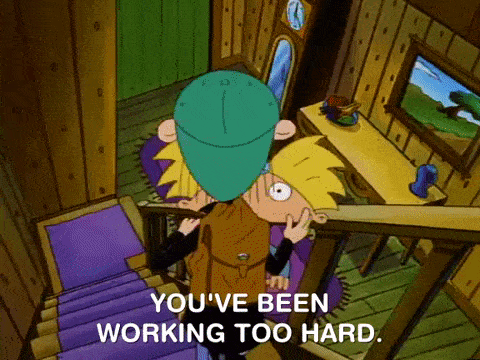
The only person you should be worrying about is YOU and your use of your free time. Plan in these other commitments, and work your plan around other aspects of your life, including time to relax and spend time with your family and friends!
Here are some things to think about:
- Work: If you have a regular work schedule, add this to your plan! If you have weekend shifts, you might be tired in the evenings or the following day, so it might be best to give yourself a break to relax. Think about your mental energy!
- Babysitting or chores: If you always have to clean the house on a Saturday morning, schedule this into your plan. That way, you don’t have to argue with your parents about why you absolutely have to skip your chores in order to pass your exams.
- Extracurricular activities: That weekly piano lesson, hockey practices, or rugby games. All of these things affect your time and energy, so include them in your plan! You’ll make a realistic plan so that you don’t get stressed out and end up procrastinating (again).
- Time to relax with family and friends (and time to chill on your own, if that’s your thing): This is so important, and you don’t want to deprive yourself of quality time with others because you’re trying to stick to a ridiculous schedule. This will end up in burnout, and back to TikTok you’ll go.
Make it Hard to Procrastinate (and Easy to Achieve)
We are always tempted to take the path of least resistance. For most of us, when we open that Google doc and stare at the cursor blinking on the screen, it’s hard. You know what’s easier? Avoiding work, and opening a Youtube browser.
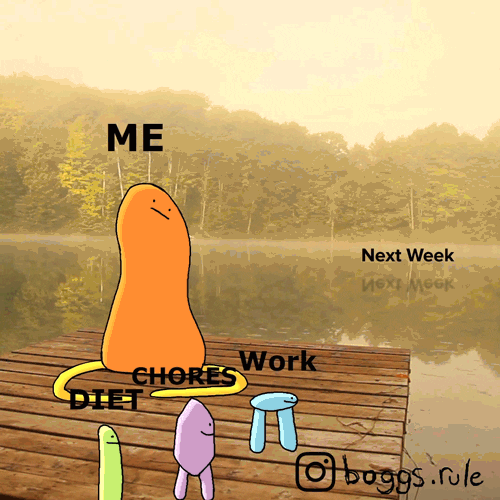
Make it hard to procrastinate, and easier to achieve your goals. You have no idea how much of a difference this makes.
Here’s what you can do:
- Prepare yourself the day before. If you know that you’ll be studying tomorrow, let’s say you want to do some maths, make it easier for yourself by taking out your maths book and a calculator, and setting up your desk. That way, you can’t procrastinate tomorrow by finding your tools and setting everything up.
- Your environment impacts how productive you feel. Try to give yourself a specific environment for studying, where you don’t watch tv, or scroll on TikTok. A desk or dining room table is perfect and much better than chilling on your bed and trying to study.
- Put your phone away and limit other distractions. If your phone is sitting next to you, buzzing away with notifications from Instagram, of course, you’re going to have a look! Put it on ‘do not disturb’, and even in a different room, and give yourself space to get things done.
- Make yourself accountable by telling a family member your plan, so that you’re more obliged to stick to it. Alternatively, ask a friend to check in and see how you’re going. This extra support goes a long way to helping you stay on task, and feel more motivated to keep going when things get hard or boring.
Let’s Sum it Up
Procrastinating is something that we all fall into every now and then. But it doesn’t have to stop you from achieving your goals! If you have go at creating a plan, knowing that you’re a procrastinator, you’ll be far more likely to get work done, and you might find that studying isn’t as bad as you thought it’d be.
With all that being said, we wish you all the best for the upcoming exams. You’ve got this!

0 Comments